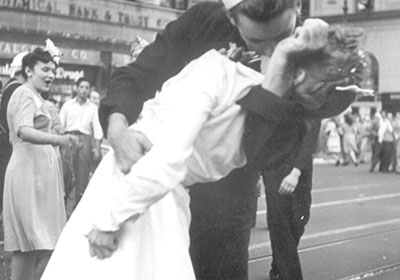by WorldTribune Staff, March 5, 2024
The iconic photo of a sailor kissing a woman in Times Square to mark the end of World War II will not be banned from Veterans Affairs (VA) facilities.

VA Secretary Denis McDonough said he overruled plans to ban the photo from all department health care facilities.
The ban was announced internally at VA medical facilities late last month in a memo from RimaAnn Nelson, the Veterans Health Administration’s top operations official.
Employees were instructed to “promptly” remove any depictions of the famous photo and replace it with imagery deemed more appropriate.
“The photograph, which depicts a non-consensual act, is inconsistent with the VA’s no-tolerance policy towards sexual harassment and assault,” the memo stated.
“To foster a more trauma-informed environment that promotes the psychological safety of our employees and the veterans we serve, photographs depicting the ‘V-J Day in Times Square’ should be removed from all Veterans Health Administration facilities.”
The memo garnered public scrutiny after it was posted online by the X account EndWokeness on Tuesday.
“This image is not banned from VA facilities — and we will keep it in VA facilities,” said a post from McDonough’s official X account. Department officials echoed in a separate statement that “VA will NOT be banning this photo from VA facilities.”
Officials said the memo should not have been sent out and was formally rescinded on Tuesday. They did not provide details of whether senior leaders were consulted on the matter ahead of Nelson’s memo.
In her memo, Nelson noted that use of the photo in VA facilities “was initially intended to celebrate and commemorate the end of World War II and the triumphant return of American soldiers. However, perspectives on historical events and their representations evolve.”
Nelson wrote that the non-consensual nature of the kiss and “debates on consent and the appropriateness of celebrating such images” led to the decision.
Let me be clear: This image is not banned from VA facilities – and we will keep it in VA facilities. pic.twitter.com/dYSikLxHAJ
— Secretary Denis McDonough (@SecVetAffairs) March 5, 2024
Quality Resource for Citizen Journalists
